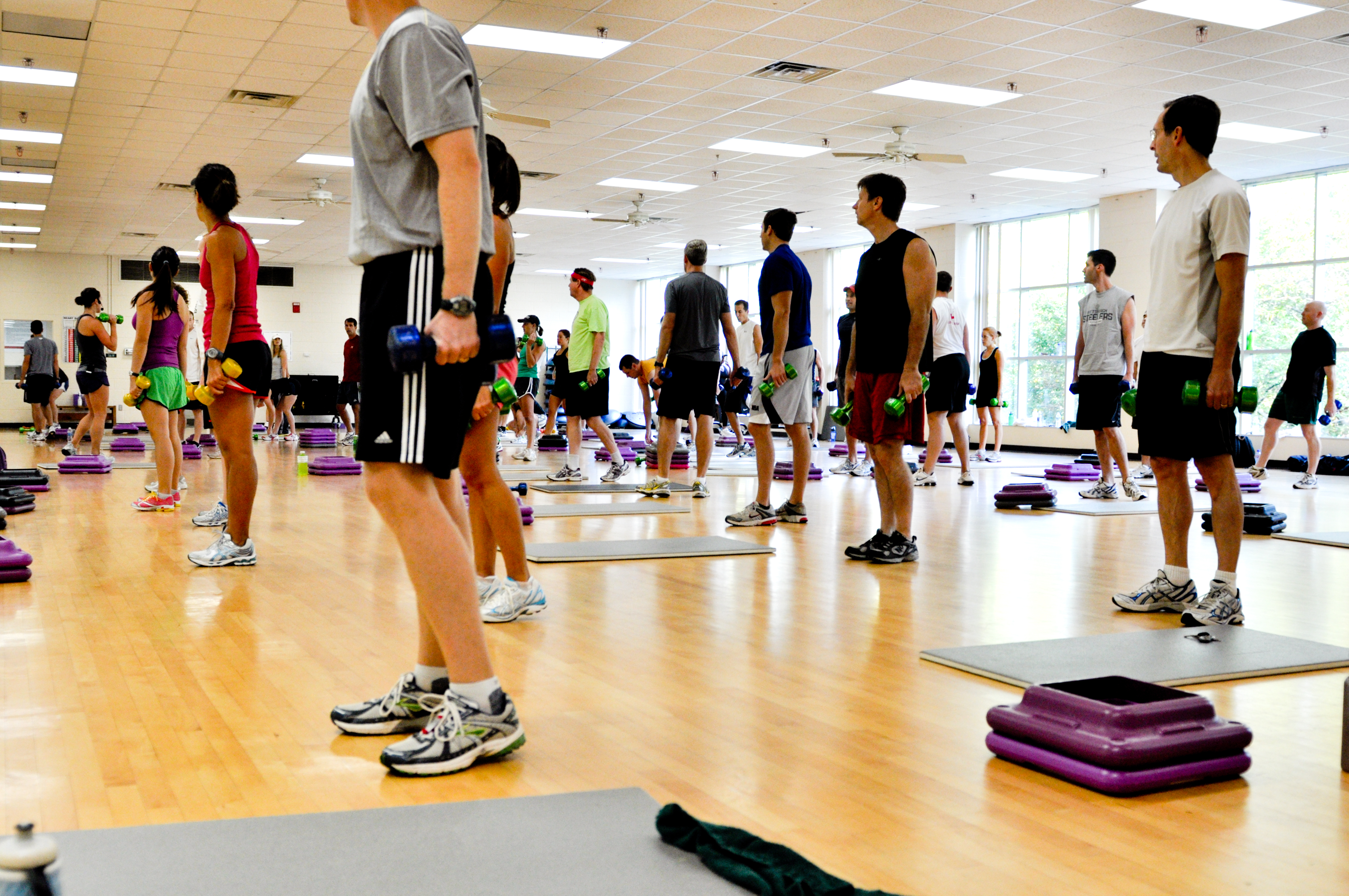Jen Sinkler is a longtime fitness writer and personal trainer based in Minneapolis who believes that, above all else, fitness should be fun. In her weekly column, "Strongly Worded," she explores what it means to be a confident, mindful, unapologetically strong woman.
My friend Jill Coleman (pictured above) and I have somewhat different working approaches to fitness. Coleman, a strength, nutrition, and wellness coach based in Winston-Salem, North Carolina, has more of a physique competitor's approach, using body-part splits (that is, training certain body parts on certain days) and more isolation work. I, on the other hand, tend to incorporate more multi-joint lifts and heavier weights. That said, the results tend to be similarly effective for both us and our clients in reaching stated goals. That’s because, well, resistance training is awesome in any form, of course, but also because we are extremely closely aligned on the mindset front.
We both believe that when it comes to good fitness and nutrition, the single most important frontier is not which muscles you work or what food you put into your belly, but your mental attitude toward the process.
Jill and I spoke recently about some of the surprising and super-helpful ways that mindset factors into fabulous health and fitness. (Our conversation has been edited for space and clarity.)
Jen Sinkler: One of the reasons you and I first bonded is our similar outlook on health—and I say health, but you know I really mean life. We both believe we are largely in charge of the course of our lives. We can't always control what happens to us, of course, but we can always control our reaction to it. Give me some real-life examples of how this applies to fitness and nutrition.
Jill Coleman: One of the biggest mindset issues I encounter, particularly as it pertains to fitness or nutrition, is the perceived unfairness of it all, especially when it comes to fat loss. For example, a woman might embark on a new meal plan with her husband, and after two weeks, he’s down 10 pounds—seemingly effortlessly—while she’s working like crazy to shed two. And the truth is that the process isn’t fair—it’s not linear or predictable, even though we want it to be.
So, there’s a choice here: Get your mind right and work on things like patience, consistency, and resiliency, or play the victim card: “It’s not fair!” Your mindset sets the tone for your perception of the process. When your mindset is on point, the urgency and helplessness fall away, and that’s when real, sustainable change occurs.
JS: Dude, yes. Your perception of the process is everything. And a common stumbling block is scarcity mindset—that is, the idea that there isn’t enough of something, so you have to act now, eat now. This is in contrast to abundance mindset, where you trust that there will be other opportunities and focus on the long game.
JC: Yes! I love applying the abundance mindset to fitness and nutrition. We normally hear about this dichotomy in terms of money or business, but it’s also, again, about your perception of food and exercise. How do you view those things? One example of having a scarcity mindset around food is coming right up, and that’s the holidays. We think, “It’s Grandma’s special pumpkin pie; I can’t possibly say ‘no’!” Maybe you can’t, but realize that in that moment, you are choosing to feel as though there’s a finite amount of pumpkin pie and if you don’t eat this one right here and now that you are missing out. I call this “food FOMO” [fear of missing out].
When it comes to fitness, the scarcity mindset pops up when we think if we can’t follow a plan exactly, it’s not worth following at all. The truth is that it’s not perfection that generates results; it’s consistency over time. The most successful people prioritize 90-percent consistency for months and even years.
JS: I love the story of how you came up with and practiced your "One-Fry Rule,” and I love seeing it in action. Tell the story of how it originated, and share why you think that concept works on a broader basis.
JC: After competing in fitness shows for years, I had developed the tendency to eat in an all-or-nothing manner, so if I wasn’t “on plan” and eating perfectly, I was way off and bingeing. But after essentially reaching complete misery and getting fed up with myself, I started trying to teach myself moderation.
I started one practice that helped me essentially stay mindful when it came to how full and how satisfied I was when eating, and I named it the “One-Fry Rule.” My brother Danny was 20 years old and came to live with my husband and me for a couple years. We would often go out to dinner, and as is the case with 20-year-old boys, they order a burger and fries everywhere they go. So I started simply snagging one fry off Danny’s plate every meal. I started by drenching it in ranch dressing and then enjoying the taste of it.
Over time, it helped me learn a) to take a single bite of something and then move on, which seemed impossible for years, and b) the more satisfied I felt by my meals, the less likely I’d be to overindulge later.
JS: So, in other words, you realized that, oftentimes, indulging just a little bit is enough. I’ve tried to emulate you on this because, man, do I love dessert, but if I pay close attention to my hunger cues, the truth is I don’t usually want the whole thing. It can be tough, though—so much of what we do is on autopilot. How can someone who is struggling to eat well or stick to a fitness routine improve her mindset?
JC: It’s easy to get caught up in trying to figure out the very best exercises to do and worrying about which exact diet to follow. As humans, we like rules and lists. But all of them are secondary to how you view the process.
The number one thing that successful people do is stay consistent. They are resilient and know that they are always one meal away from being back in healthy mode. Self-compassion helps them move on faster after dietary slips or skipped gym days. They trust that we are all doing our best and all we can control is what we do next.
People who are successful have been making good—not perfect!—choices for weeks, months, and years. They know that the fast fix is also the transient one. So they buckle down for the long haul and adjust their expectations so that they’re not disappointed if they haven’t seen results in just a matter of days.
JS: One reason many people give for not exercising regularly or not eating healthy is “I have no time.” This is understandable—many of the easy choices we’re presented with aren’t awesome whatsoever, fast food being a good example. But this sentiment is ultimately not helpful, and there is plenty you can do in a short amount of time in terms of both food, like protein and veggies and great big salads, and exercise—hello, circuit training! What do you say to people who have no time?
JC: I get it because I did this myself for many years—garnered my self-worth from busy-ness. When you are busy, you are doing important stuff, right? And if you insist that you don’t have any time, well, then you definitely won’t ever have any time. It’s a belief system, first and foremost.
I think it’s about recognizing your priorities and understanding that motivation is directed differently for people. Everyone is motivated, but not everyone is motivated to devote time to health and fitness. And that’s fine, no judgment! Just own your choice and where you put your attention. It might be on being an amazing mom or your successful career or maintaining your household. Understand that where you put your focus is where your results show up.
If you genuinely want to find time to get fit, however, you have to stop being a victim of your own schedule. It can feel like you don’t have any choices, but you do—even if the changes necessary to create time seem impossible or may lead to discomfort or the need to do some serious rearranging. You don’t need to be all in from the get-go. Just start with one single change, such as skipping TV one single night to hit the gym instead. Get some wins under your belt, and over time, you create a feed-forward cycle that leads to more success on the fitness and nutrition front.
Jen Sinkler is a longtime fitness writer and personal trainer based in Minneapolis who talks fitness, food, happy life, and general health topics at her site, jensinkler.com, and writes for a variety of national health magazines. Earlier this year, she authored Lift Weights Faster, an e-library of over 130 conditioning workouts for fat loss, athleticism, and overall health.
Jen works with clients at The Movement Minneapolis, a facility that uses biofeedback-based training techniques. She is a certified kettlebell instructor through the RKC (Level 2) and KBA, and an Olympic lifting coach through USA Weightlifting; she also holds coaching certifications through Primal Move, Progressive Calisthenics, CrossFit and DVRT (Ultimate Sandbag).
Source
http://www.womenshealthmag.com/fitness/health-and-fitness-mindset






This is actually the kind of information I have been trying to find. Thank you for writing this information.
ReplyDeleteTruvisioncare.com